 Iran’s Attack on Israel
Iran’s Attack on Israel
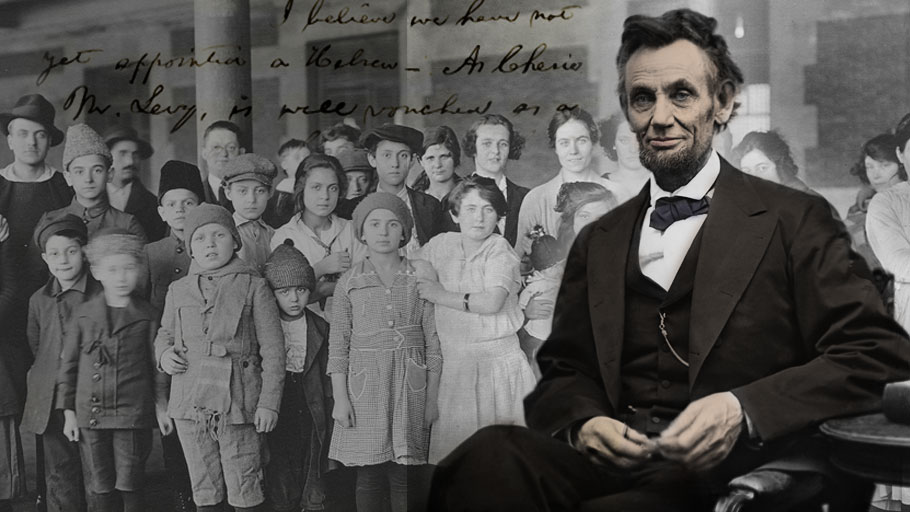

16 min read
Snapshots of Lincoln’s remarkable relationship with Jews.
President Abraham Lincoln maintained the Union and freed America’s slaves. Less known is that he also championed the rights of Jewish Americans, even when it was difficult and unfashionable to do so.
Here are ten snapshots of President Lincoln’s remarkable relationship with Jews and examples of Lincoln’s support for full rights for his fellow Jewish citizens.
Pres. Lincoln has been called America’s most biblically literate president. He regularly quoted from the Bible in letters, speeches and ordinary conversation. Unlike many American Christians of his time, Lincoln eschewed the habit of focusing primarily on the Christian parts of his Bible, and seemed remarkably comfortable with the Torah (the so-called “Old Testament”).
According to historian Jonathan Sarna, Lincoln quoted from the Old Testament much more often than from the New Testament. In his surviving letters, Lincoln mentions God over 420 times, yet remarkably never refers directly to Jesus.
One example of Lincoln’s familiarity with the Jewish Bible can be seen in his June 29, 1863 letter to General Robert Milroy. Reprimanding the general for his disobedience, Lincoln referenced the Jewish story of Moses, who sinned by losing his temper and struck a rock. “This, my dear general, is I fear, the rock on which you have split”, Lincoln chided the general, vividly drawing on this famous Jewish story.
Unlike many 19th Century American Christians, Abraham Lincoln considered many Jews his friends. The first Jew whom Lincoln might have befriended was Julius Hammerslough, a young store owner in the Illinois state capitol of Springfield. When Lincoln was elected to the Illinois State Legislature in 1834, he met Hammerslough and took the unusual step of socializing with the young merchant.
By all accounts, Hammerslough was a proud Jew. As a young man he’d served as secretary of Baltimore’s Hebrew Assistance Society. In 1865, when his new home town of Springfield built its first synagogue, Hammerslough served as its president. At a time when Jews were viewed with suspicion, Lincoln treated Hammerslough as an equal. Once Lincoln became president, Hammerslough was a frequent guest at the White House. Hammerslough died in 1908; his obituary in the New York Times described him as a “warm friend of Abraham Lincoln”.
One of Lincoln’s closest friends was Abraham Jonas, a Kentucky merchant, lawyer and politician who supported and encouraged Lincoln for most of his life. Jonas was one of the very first public figures to encourage Lincoln to run for president; he was also the only person Lincoln ever referred to as “one of my most valued friends”.
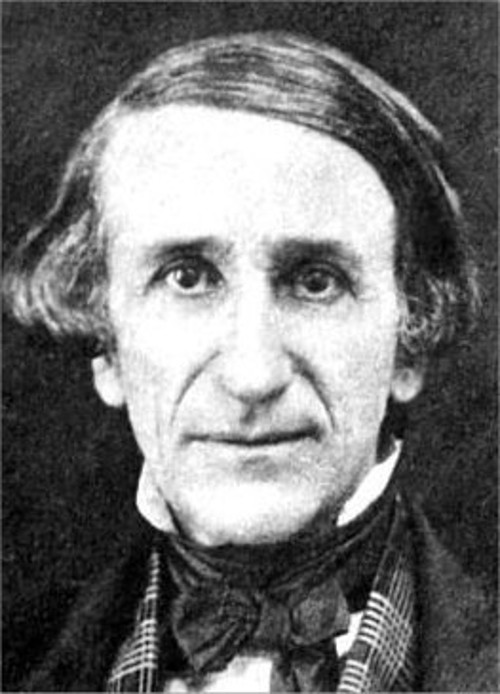 Abraham Jonas
Abraham Jonas
Born into an Orthodox Jewish family in England, Jonas moved to Cincinnati with his brother as a teenager in 1819. The pair established Ohio’s first synagogue. Jonas later served in the Kentucky House of Representatives, and eventually settled in Quincy, Illinois, where he became a lawyer and politician. There, Jonas’ religion was plain to all: his law office was in the same building as Quincy’s Congregation B’nai Abraham synagogue, which Jonas and his brothers had helped establish.
Congress’ passage of the 1854 Kansas-Nebraska Act, allowing the westward expansion of slavery into new states, horrified both Jonas and Lincoln; both spoke out against the measure and against slavery. It was Abraham Jonas who first invited Lincoln to debate Sen. Stephen A. Douglas, who supported the Act, in what would become the famous Lincoln-Douglas Debates, some of the most seminal American political speeches ever made, concerning slavery and the nature of the American union.
When the Civil War broke out, both Lincoln’s and Jonas’ own families found themselves on both sides of the divide: two of Abraham Jonas’ five sons fought for the Confederacy. When his neighbors in Quincy demanded that Jonas resign his position as the city’s postmaster because he had sons fighting Illinois, Jonas issued an anguished response:
If it be true, as they say, that two of my sons are in the rebel army, however grieved I may be at the knowledge thereof, all true men who know me will sympathize with me and admit that I have no control in the matter. My five boys were in the South many years before the rebellion, and when last heard from were all loyal to the Union. That two of them, like hundreds of other loyal men, should have been compelled to join the rebel army I am not prepared to deny, since I have not received a line from any of one of them since the commencement of this unhappy war.
Jonas’ son Charles was captured and sent to a Union prisoner of war camp in Ohio. Abraham Jonas’ health began to deteriorate, and in 1864, as Jonas lay on his deathbed, his daughter Annie sent word to Lincoln that his old friend wasn’t long for the world, and asked that Charles be released so he could visit his father once more before he died. Lincoln at once penned a note to Charles’ jailers: “Allow Charles H. Jonas, now of prisoner of war at Johnson’s Island, a parol(e) of three weeks to visit his dying father.” Charles rushed home to Quincy on June 8, 1864, just in time for Abraham Jonas to see and recognize him. Abraham Jonas died later that day and was buried in the Jewish Sunset Cemetery in Quincy, Illinois.
Lincoln lived at the dawn of the invention of photography. Some of the most iconic photos of him were taken by Samuel Alschuler, a Jewish photographer in Illinois.
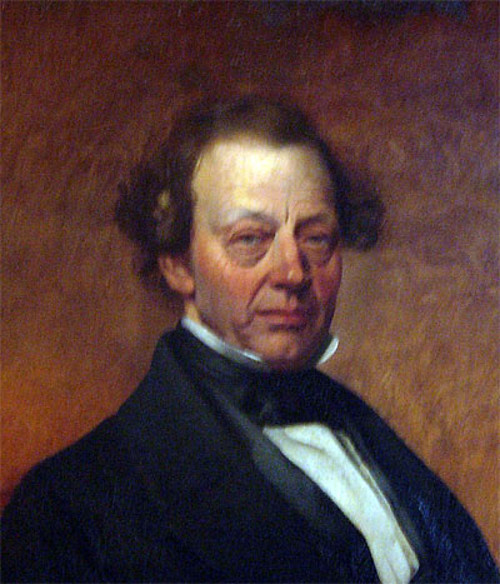 Samuel Alschuler
Samuel Alschuler
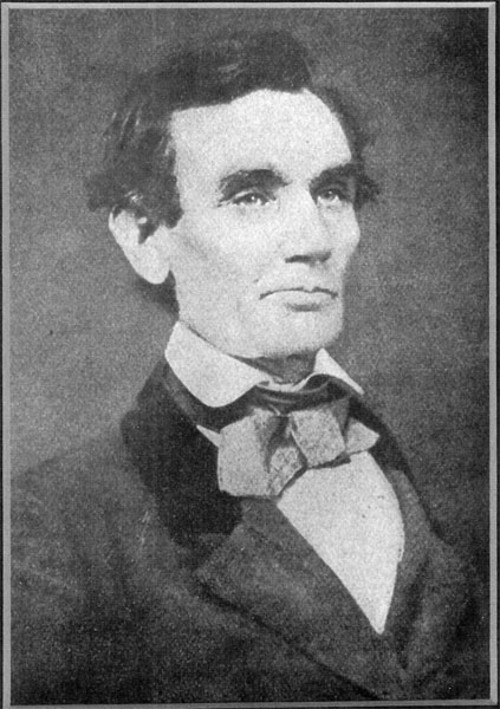 The photo of Abraham Lincoln taken by S. Alschuler
The photo of Abraham Lincoln taken by S. Alschuler
Born in Bavaria in 1826, Samuel Alschuler moved to the United States and opened a portrait studio in Urbana, Illinois. On April 25, 1858, Alschuler received a distinguished visitor: Abraham Lincoln, then campaigning for Senate. The then-beardless Lincoln was dressed in an old linen coat that Alschuler felt was too shabby for a photo. He asked Lincoln if he had another coat to change into. Lincoln replied he’d left his other coats at home, and Alschuler – who was about a foot shorter than the future president – offered his own velvet-trimmed coat instead.
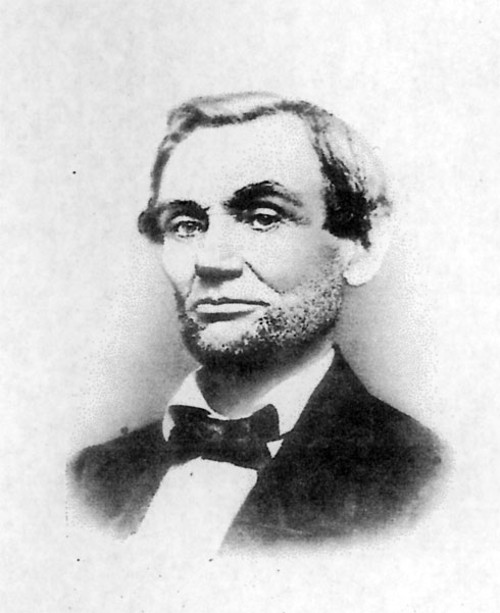 Alschuler’s photo of president-elect.
Alschuler’s photo of president-elect.
Lincoln sat for Alschuler again two years later, after he was elected President. The second photo shows a very different looking Lincoln: he’d started to grow his famous beard – and had also brought his own formal coat for the sitting.
As Civil War raged, Lincoln recruited military and civilian leaders to help lead the fight. He openly appointed Jews, never disparaging them for their religion, as many of his contemporaries routinely did. One of Lincoln’s earliest Jewish wartime appointments was Alfred Mordecai, Jr., whom Lincoln appointed second lieutenant in 1861, after the fall of Fort Sumter. In addition to officers, Pres. Lincoln also appointed about 50 Jews to be Quartermasters, overseeing housing, supplies, transportation and clothing for the troops.
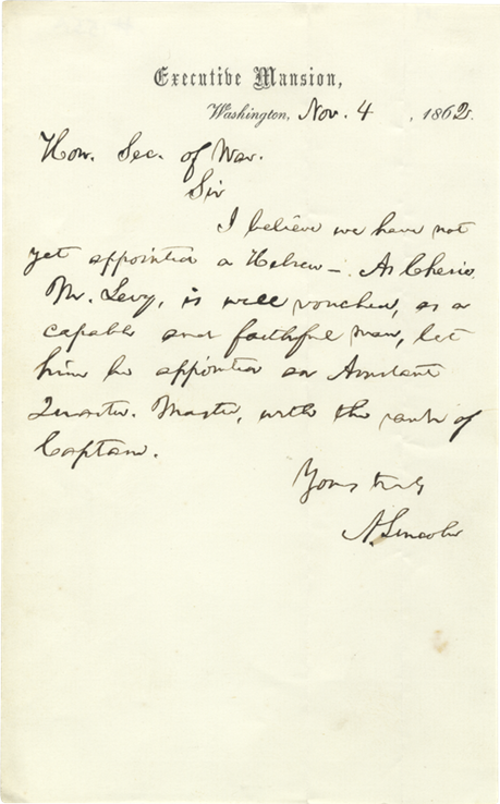 Lincoln’s memo to appoint a Hebrew
Lincoln’s memo to appoint a Hebrew
In 1862, when an Orthodox Jew, Cheme Moise Levy, who came from a distinguished New York rabbinic family, applied to be a military Quartermaster, his very obvious Jewishness seems to have endeared him to Lincoln. “I believe we have not yet appointed a Hebrew,” Pres. Lincoln wrote to Secretary of War Edwin M. Stanton, urging Levy’s appointment. Cheme Levy became Captain Levy in the Union Army, and helped distribute food and clothing to Jewish soldiers who’d been wounded in battle.
In the middle of the night one day in 1861, Pres. Lincoln was informed that two men were at the White House and demanded to see him. They were Thomas Corwin, a former Ohio senator who was now working as a lawyer in Washington DC, and Simon Wolf, a Jewish lawyer whose family had moved to the United States from Germany and was one of Lincoln’s many Jewish friends. Wolf had just received word of a Jewish soldier in the Union Army who was about to be shot for desertion; the two lawyers paid a midnight visit to Lincoln to plead the soldier’s case and save his life.
The Jewish soldier’s “crime” was rushing to the bedside of his dying mother, who’d begged to give him one last blessing and see him again before she died. Lincoln was generally sympathetic to the cause. He’d recently written “When I think of these mere lads, who had never before left their homes...and then in the camp or on the battlefield a thousand miles from home, longing for its rest and safety, I have so much sympathy for him that I cannot condemn him to die for forgetting the obligations of the soldier in the longing for home life. There is death and woe enough in this war without such a sacrifice”. Yet it was Lincoln’s generally willingness to pardon deserters that nearly cost this one Jewish soldier his life.
Secretary of War Edward McMasters Stanton had had enough of Lincoln’s leniency, and threatened to resign if the President pardoned one more deserter. Lincoln told Wolf and Corwin there was nothing he could do. Instead of leaving, Simon Wolf made one last impassioned plea:
What would you have done in the boy’s place? If your dying mother had summoned you to her bedside to receive her last message before her soul would be summoned to its Maker, would you rather have been a deserter to her who gave you birth or a deserter in law but not in fact to the flag to which you had sworn allegiance?
Lincoln was very moved, and rang a bell to summon his secretary, ordering him to send a telegram immediately, in the middle of the night, to stay the Jewish soldier’s execution. The soldier went on to serve heroically and was killed in 1864 at the Battle of Cold Harbor as he lead a charge against the enemy, holding the Union flag as he fell. When Lincoln heard of the boy’s death, he said “I thank God for having done the right thing” in staying his execution years before.
At the start of the Civil War, 30 chaplains served in the American army; none of them were Jewish since federal law stipulated that chaplains must be Christian. In 1861, one heavily Jewish Pennsylvania regiment tried to circumvent this rule by appointing a young Hebrew teacher from Philadelphia named Michael Allen as a volunteer Jewish chaplain. Since the letter of the law stipulated that a military chaplain received pay, this was a way of getting around the ban. Allen’s appointment sparked a vigorous backlash and he was soon forced to resign.
Cincinnati’s Isaac Mayer Wise, who led a Reform congregation and also published a Jewish newspaper called the Israelite, began a campaign, calling on Jews across the country to “petition (Congress) from all parts of the U.S.”, to encourage their non-Jewish neighbors to sign petitions, and to send petitions calling for Jewish military chaplains “to your representative or senator”. Petitions began pouring in, from both big cities with large Jewish populations like Baltimore, as well as tiny towns with hardly any Jews such as Edinburgh, Indiana and Columbus, Iowa.
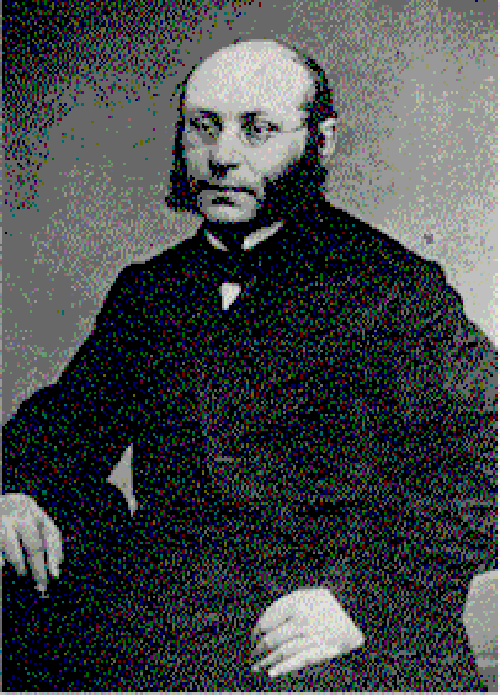 Rabbi Arnold Fischel
Rabbi Arnold Fischel
A Jewish communal organization sent Rabbi Arnold Fischel, a learned Philadelphia Jew, to Washington DC to lobby for Jewish chaplains in person. After petitioning for a meeting with President Lincoln, on December 11, 1861, Fischel was invited to the White House and, as he later described “at once invited to (Pres. Lincoln’s) room and was received with marked courtesy”. Fischel later recalled Lincoln’s words: “He truly admitted the justice of my remarks, that he believed the exclusion of Jewish chaplains to have been altogether unintentional on the part of Congress (and) that something ought to be done to meet this case.”
Lincoln himself went to work lobbying Congress to allow Jewish chaplains. He faced strong opposition from some Christian denominations, but eventually succeeded: a 1862 law changed the requirements to become a military chaplain, made the vetting process more rigorous and professional, and for the first time in history allowed non-Christians in the post. Lincoln threw his support behind Jewish chaplains, and approved the first Jewish military chaplain on September 18, 1862: Rev. Jacob Frankel of Rodef Shalom congregation in Philadelphia.
On December 17, 1862, General Ulysses S. Grant issued a hateful decree: General Orders No. 11, which expelled all Jews (“Jews as a class”) from the areas under his control, which stretched from northern Mississippi to the southern tip of Illinois, and from the Mississippi to the Tennessee Rivers.
A long-time anti-Semite, Grant had come to think of Jews as speculators and war profiteers. The fact that thousands of Jews were heroically serving in the Union Army at the time seemingly did nothing to change his anti-Jewish hatred. Luckily for many of the Jews in the area, news of General Orders No. 11 moved slowly, hampered by fighting that damaged telegraph lines.
While many communities didn’t receive Grant’s expulsion orders, several individual Jews were robbed and abused by people who’d heard of them. On December 28, 1862, news of the orders reached the town of Paducah, Kentucky. Chillingly, the city elders seem to have had no trouble putting them into action, giving the town’s Jewish residents 24 hours to leave. Women and children were forced out of their homes too. The scene was chaotic: one baby was nearly lost, and two Jewish women who were elderly and very sick were unable to move. Non-Jewish neighbors volunteered to take them in and care for them.
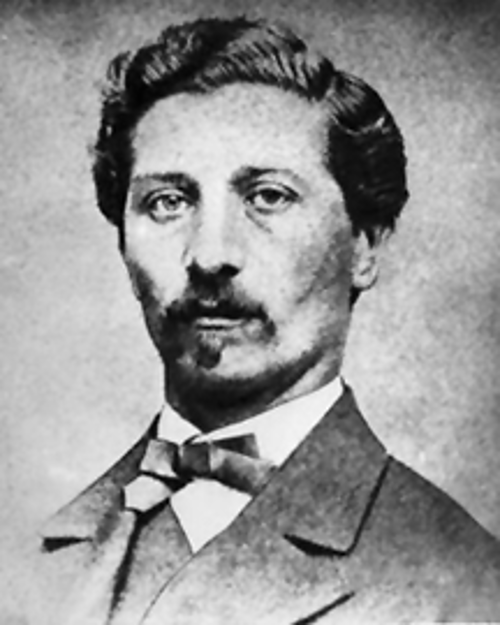 Cesar Kaskel
Cesar Kaskel
Cesar Kaskel, a prominent Jewish resident of Paducah, sent a desperate telegram to Pres. Lincoln which never arrived. Kaskel then rushed in person to Washington DC and called on a friend who was a Congressman for help in reaching the President. Kaskel received and audience with Lincoln right away and discovered that Lincoln had not yet been informed of his General’s anti-Jewish decree. The President reassured Kaskel that America’s Jews would have Lincoln’s “protection...at once”.
Lincoln immediately turned to Henry Halleck, the General in Chief of the Union Army, ordering him to counter General Grant’s odious order. On January 6, 1863, Grant’s headquarters was forced to send out several telegrams to all corners notifying those in the areas he controlled that “By direction of the General in Chief of the Army at Washington, the General Order from these Head Quarters expelling Jews from this Department is hereby revoked.” (General Grant went on to become the 18th President of the United States, running in the same Republican party that was home to the very different, and very tolerant, President Lincoln.)
The day after the order was revoked, a delegation of Jewish leaders travelled to Washington DC to thank the President. Lincoln carved out time in his busy day to meet with them, and, according to Isaac Mayer Wise, who attended and later wrote about the encounter, assured his Jewish visitors that he knew “of no distinction between Jews and Gentile” and stressed his revulsion at Gen. Grant’s orders and virulent anti-Semitism.
In 1863, in the midst of the Civil War, eight telegraphers staffed the Union Army’s telegraph office in Washington DC. One of the young telegraphers was a 19 year old Jew from Bohemia named Edward Rosewater. Rosewater described the president in letters to his fiancé Leah: “Every morning about 8 o’clock (Pres. Lincoln) comes in to read Dispatches which are copied into books…. His house being near to this, he is here often. Sometimes, he tells an anecdote, or reads as Story aloud and laughs [You could hear him ½ mile].”
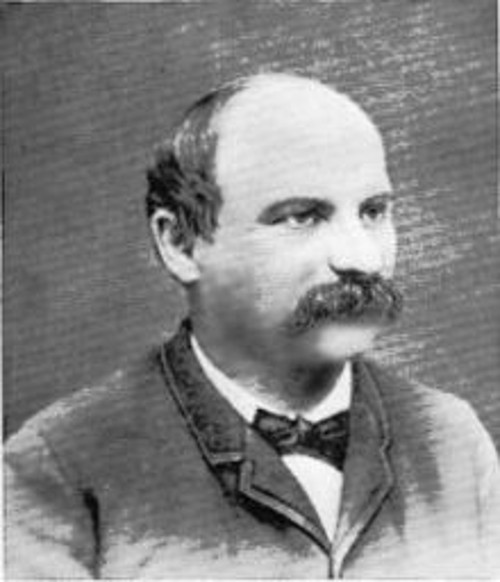 Edward Rosewater
Edward Rosewater
Rosewater was present on January 1, 1863, when Lincoln signed a historic decree, and declared “I never in my life felt more certain that I was doing right than I do in signing this paper.” It was the Emancipation Proclamation, freeing over 3 million slaves. A few hours later, as Pres. Lincoln watched, Rosewater typed the document into the telegraph’s machinery, sending it far and wide throughout the country. “And upon this act,” Rosewater typed, “sincerely believed to be an act of justice, warranted by the Constitution, upon military necessity, I invoke the considerate judgment of mankind, and the gracious favor of Almighty God.”
Abraham and Mary Lincoln were ardent theatre-goers. Surprisingly, they seem to have particularly enjoyed plays with Jewish themes. In the years before Lincoln’s assassination they watched a play called Gamea, or The Jewish Mother and enjoyed it so much they went back to see it again a few days later. They also watched The Merchant of Venice and a Leah, the Forsaken about a Jewish woman facing down prejudice and persecution.
On April 14, 1865, the Lincolns were watching a play in Washington DC’s Ford Theatre when Lincoln was gunned down by John Wilkes Booth, an enraged and unbalanced actor. Later, Mary Todd Lincoln said Abraham had just a few minutes earlier said that he hoped one day they could travel to visit the land of Israel together.
At least one Jewish doctor was among those who treated the wounded president: Charles H. Liebermann, a prominent Jewish doctor who was born in Russia and lived in Washington DC, where he’d helped create Georgetown University’s Medical School. Dr. Liebermann tried to pour brandy down Lincoln’s throat in a desperate effort to revive him, but was unsuccessful. Lincoln died the following day.
Among the millions who mourned the 16th President, many Jewish congregations held special services and composed prayers for their beloved president. When Lincoln’s coffin was paraded through the streets of New York, a local newspaper estimated that 7,000 Jews came out to pay their respects. In Springfield, Illinois, where Lincoln was buried on May 4, 1865, his old friend Julius Hammerslough closed his store and displayed a portrait of Lincoln with a declaration that captured what so many felt: “Millions bless thy name.”
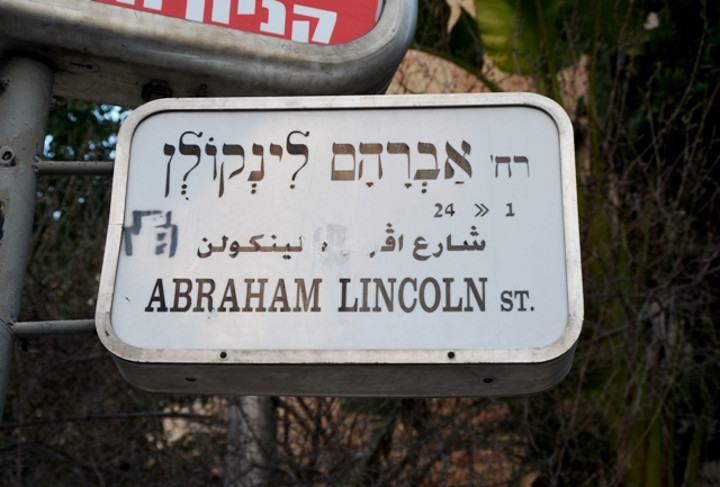
Today, in addition to monuments to Abraham Lincoln in the United States, a beautiful street in central Jerusalem is named for Lincoln, a fitting tribute to the Jewish people’s gratitude to a president who championed and defended America’s Jews.
Books for further reading include:
Lincoln and the Jews: A History by Jonathan D. Sarna and Benjamin Shapell (2015).
The Presidents of the United States & the Jews by David G. Dalin & Alfred J. Kolatch (2000).
When General Grant Expelled the Jews by Jonathan D. Sarna (2012).
Team of Rivals: The Political Genius of Abraham Lincoln by Doris Kearns Goodwin (2006).
